GLAAD Report
Unsafe: Meta Fails to Moderate Extreme Anti-trans Hate Across Facebook, Instagram, and Threads
In a June 2023 open letter facilitated by GLAAD and the Human Rights Campaign, more than 250 LGBTQ celebrities, public figures and allies pleaded with Meta and other social media companies to address the epidemic of anti-transgender hate on their platforms — citing harmful lies about transgender healthcare, malicious anti-LGBTQ “groomer” narratives, and relentless bullying and harassment of trans public figures. The list of signatories on the letter included such high-profile names as Elliot Page, Laverne Cox, Jamie Lee Curtis, Shawn Mendes, Janelle Monáe, Gabrielle Union, Judd Apatow, Ariana Grande, and Jonathan Van Ness; and the letter received extensive national media coverage.
As this new report documents, nine months later, such extreme anti-trans hate content remains widespread across Instagram, Facebook, and Threads. All of the posts below were reported by GLAAD via Meta’s standard reporting systems; Meta either replied that posts were not violative or simply did not take action on them.
As the trillion-dollar company’s revenues soar, Meta continues to lay off critical trust and safety teams and increasingly relies on ineffective AI systems for content moderation. Meta’s enforcement failures have prompted repeated rebukes and concern from the Oversight Board (the independent body that makes non-binding but precedent-setting content moderation rulings on Meta’s platforms). As Axios and The Verge have documented, some users find that their reports on harmful content are not reviewed at all.
Characterized by fear-mongering, lies, conspiracy theories, dehumanizing tropes, and violent rhetoric, these posts — many by high-follower accounts — aim to boost engagement, generate revenue, and seed hateful narratives about trans, nonbinary, and gender non-conforming people. These accounts profit from such hate, and so does Meta and its shareholders. Meanwhile, LGBTQ people and other targeted groups experience an increasing number of well-documented real-world harms stemming from these long-term anti-LGBTQ propaganda campaigns, driven by the anti-LGBTQ extremists that Meta allows to flourish on its platforms.
Below is a selection of examples of anti-transgender content, with excerpts from the policies they appear to violate (including Meta’s hate speech, violence and incitement, bullying and harassment, and suicide and self-injury policies). Note that much of the content specifically engages in dehumanization. Social media platforms like Meta prohibit dehumanizing speech against historically marginalized groups, because it can be a dangerous precursor to the perpetration of real-world violence. Nonetheless, Meta has either deemed the content not in violation of its policies, or simply didn’t take action on it.
Methodology: GLAAD reported all content via Meta’s standard platform reporting systems from June 2023 – March 2024. Policy violation examples include: the use of extreme anti-trans slurs; the use of malicious dehumanizing tropes such as referring to trans, nonbinary, and gender non-conforming people as “satanic,” “sexual predators,” “terrorists,” “mentally ill,” and “perverts;” targeted misgendering; content promoting so-called “conversion therapy;” targeted harassment of individuals and violent incitement; targeting with violent speech; and intentional coded genocidal calls for “eradication.”
| Content warning: The following report includes examples of hate speech targeting transgender people. To not further amplify anti-LGBTQ hate content or give attention to anti-LGBTQ accounts, the account names are blurred and all links go to archived versions. In most instances violative aspects are highlighted in red. In some cases, we have also blurred the faces of harassment victims. |
Policy Violation: Targeting on the basis of protected characteristics (gender identity) with a derogatory slur
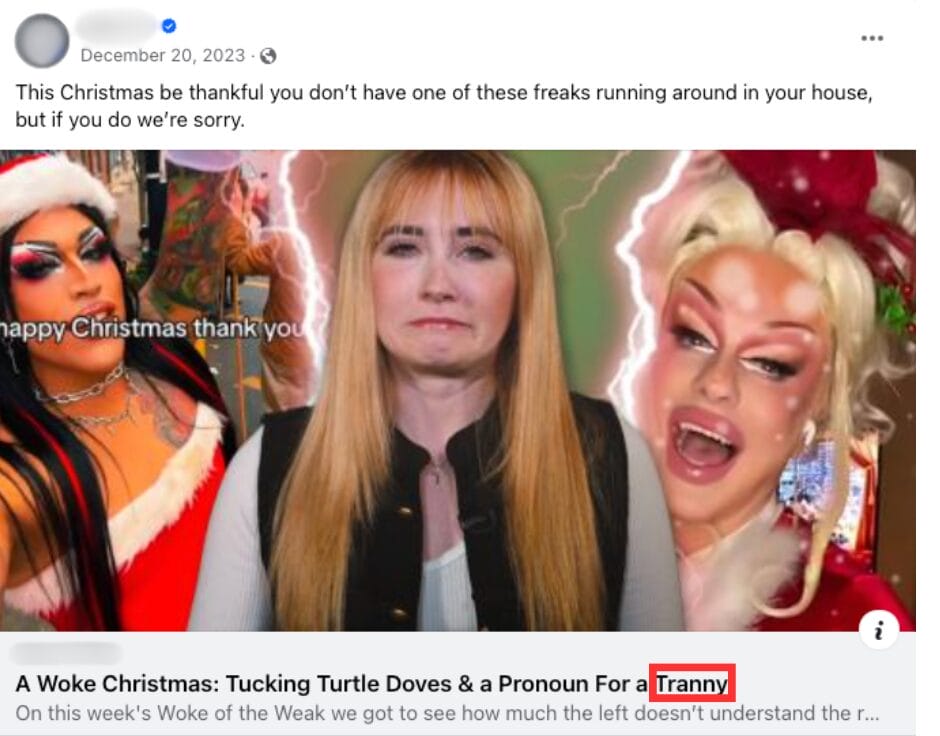
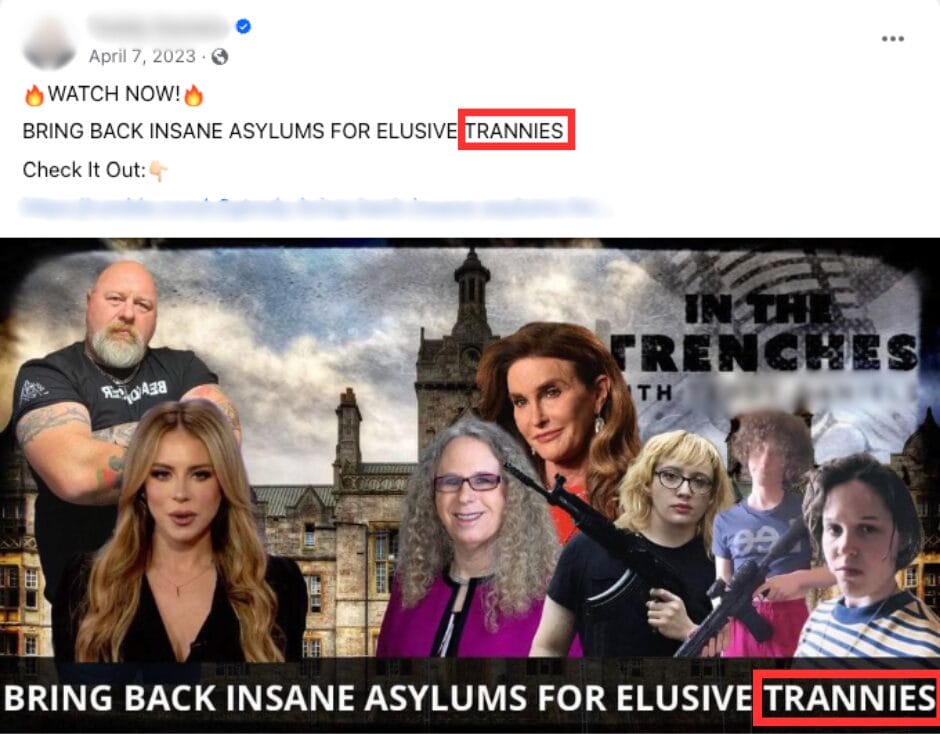
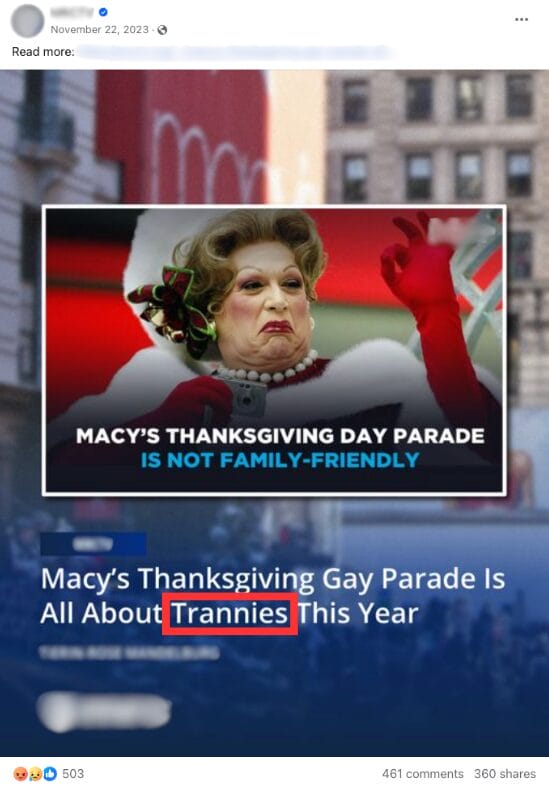
“Tr*nny” is a well-known, extreme anti-trans slur. The harmful examples above all feature this derogatory slur; this is blatant hate speech that targets all transgender people, specifically on the basis of gender identity — in direct violation of Meta’s policies. Note that one post also features targeting on the basis of gender identity with a malicious, false assertion of mental illness/insanity (a distinct policy violation as well).
Tier 1: “Do not post … Content that describes or negatively targets people with slurs, where slurs are defined as words that inherently create an atmosphere of exclusion and intimidation against people on the basis of a protected characteristic, often because these words are tied to historical discrimination, oppression, and violence.”
Tier 2: “Do not post … Content targeting a person or group of people on the basis of their aforementioned protected characteristic(s) … with: Generalizations that state inferiority in the following ways: Mental health, including but not limited to: mentally ill, retarded, crazy, insane.”
Policy Violation: Content that characterizes trans people as “demonic,” “devils,” and “satanic”

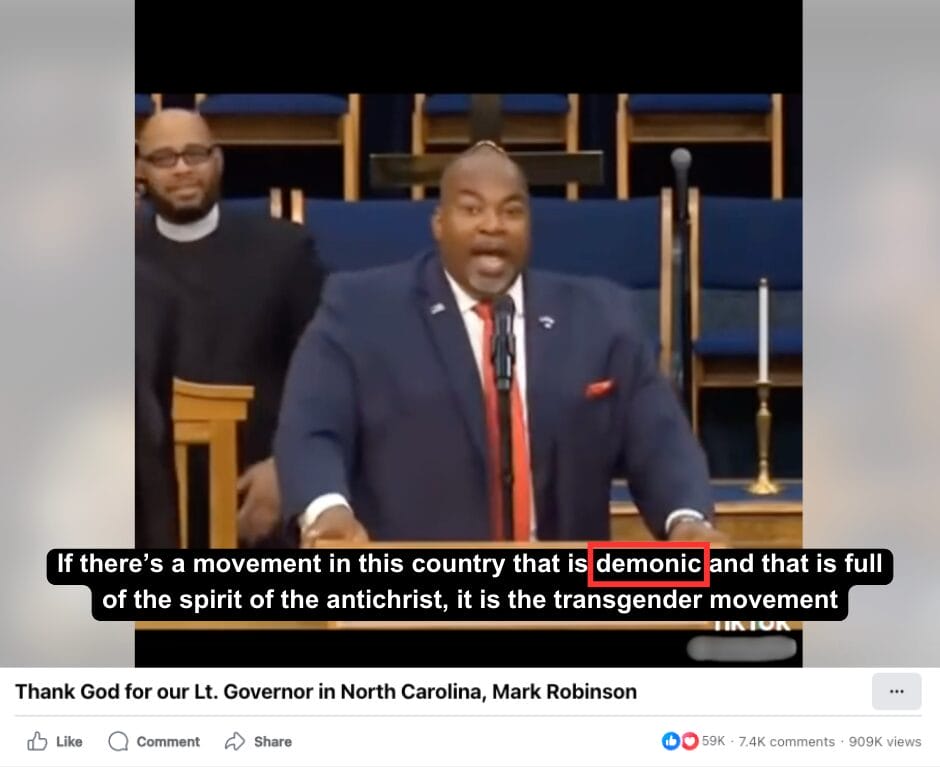
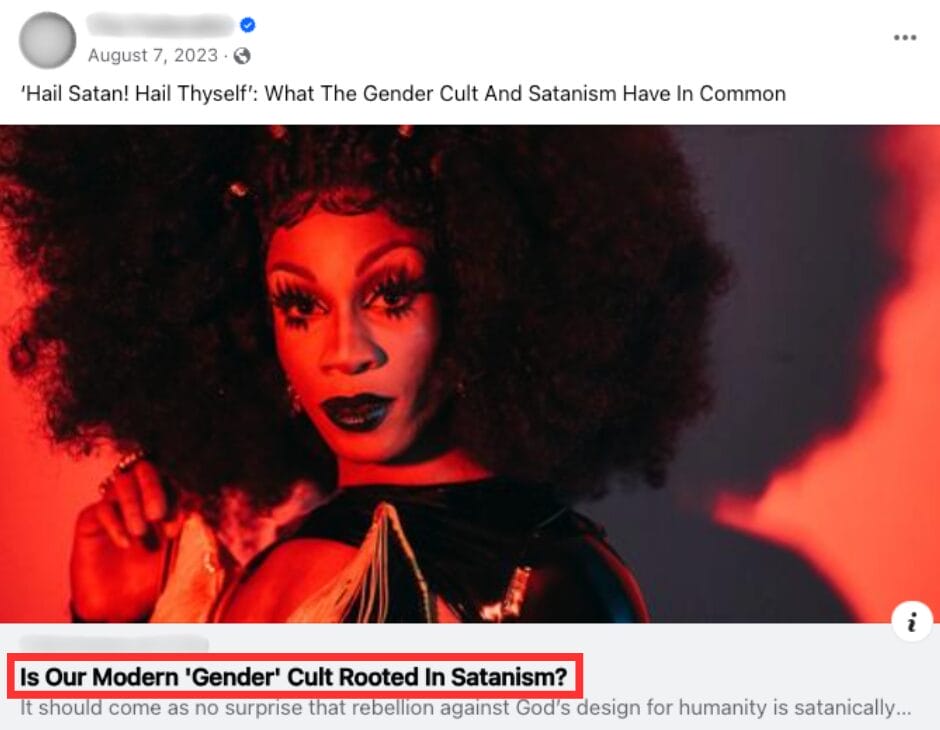
Another common anti-LGBTQ trope is to characterize trans and nonbinary people as “devils,” “demons,” “satanic,” monsters, or other subhuman entities, on the basis of their protected characteristics. This is a known method of dehumanization. As mentioned above, the hate speech policies of major social media platforms (including Meta) prohibit dehumanizing speech, because it can be a dangerous precursor to the perpetration of real-world violence against historically marginalized groups.
Meta’s tier 1 policy: “Do not post … content targeting a person or group of people … on the basis of their aforementioned protected characteristic(s) … with: Dehumanizing speech in the form of comparisons to or generalizations about: Certain Inanimate Objects and Non-Human States: Subhumanity (including but not limited to: savages, devils, monsters, primitives).”
Policy Violation: Targeting a group of people on the basis of protected characteristics as “sexual predators”
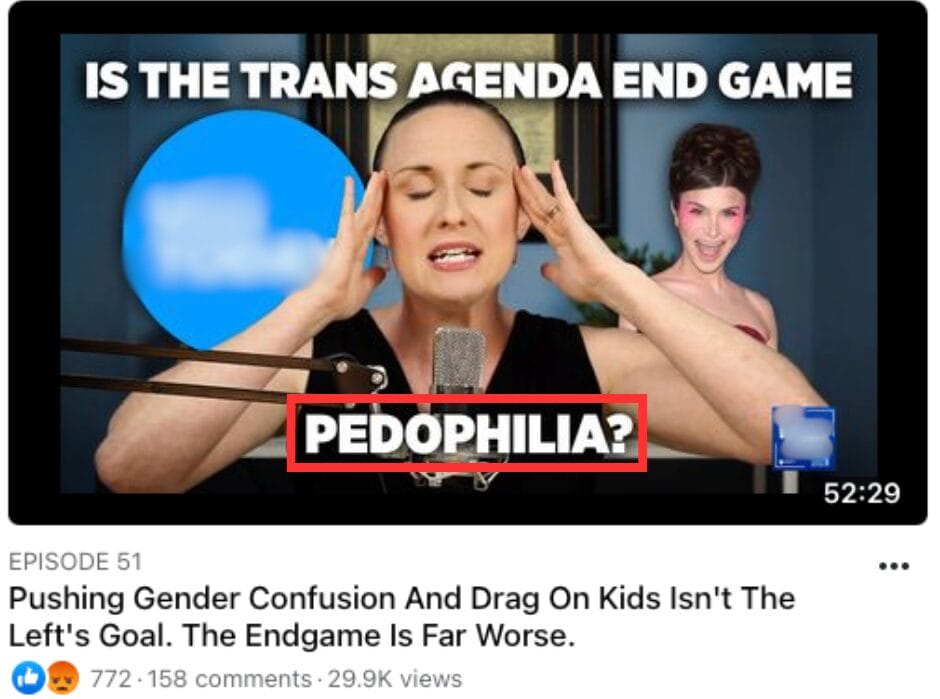
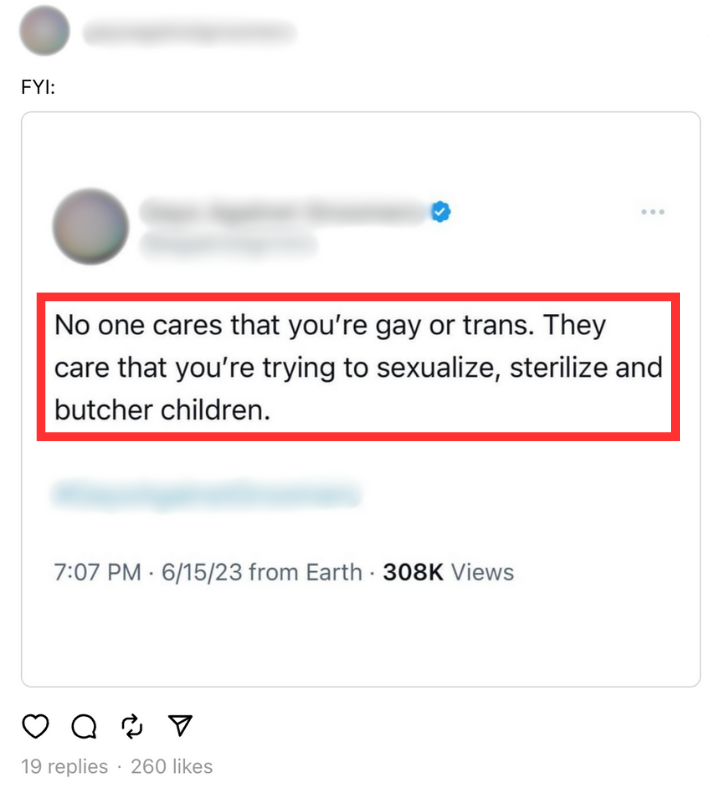
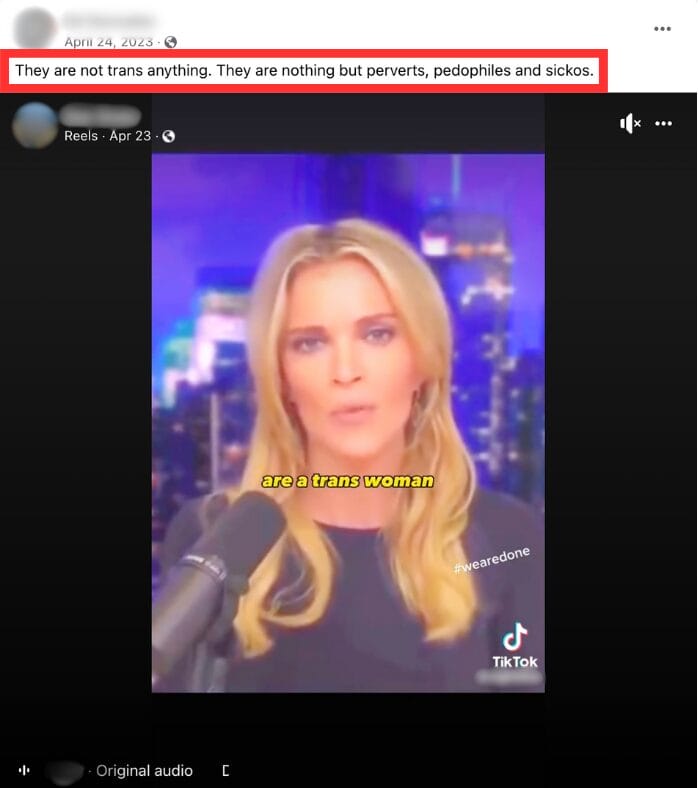
The dehumanizing anti-LGBTQ “groomer” trope is a right-wing rhetorical strategy to attack trans and LGBTQ people, and allies, by baselessly characterizing them as “sexual predators” or threats to children. Social media platforms have facilitated its spread, even though most of them have acknowledged such rhetoric as hate speech. In 2022, several social media platforms, including Meta, told The Daily Dot that: “baselessly calling LGBTQ people or the community ‘groomers’ or accusing them of ‘grooming’ is governed under their policies prohibiting hate speech.” Such rhetoric is extremely dangerous, as the Dangerous Speech Project explains: “Throughout history, accusations of threats against children have been used repeatedly against minority groups, many times leading to violence.” In 2023, Media Matters for America found that Meta profited from more than 150 ads promoting the “groomer” slur.
Meta’s tier 1 policy: “Do not post … content targeting a person or group of people … on the basis of their aforementioned protected characteristic(s) … with: Dehumanizing speech in the form of comparisons to or generalizations about: Sexual predators.”
Policy Violation: Content that falsely equates trans people to violent criminals or “terrorists”
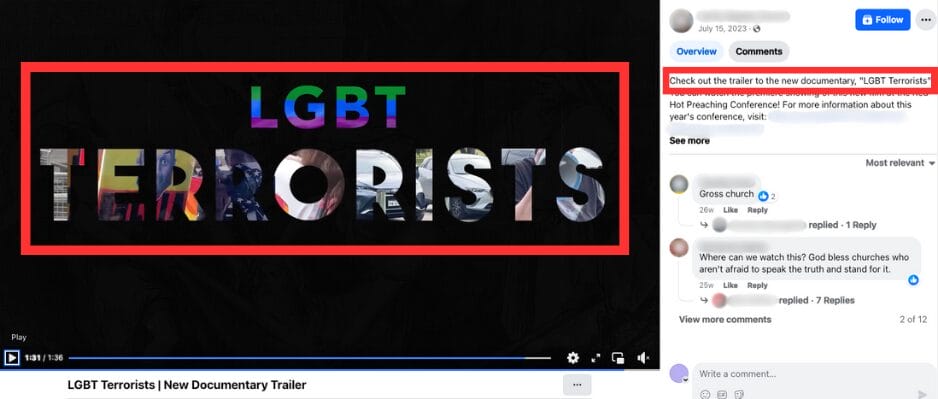
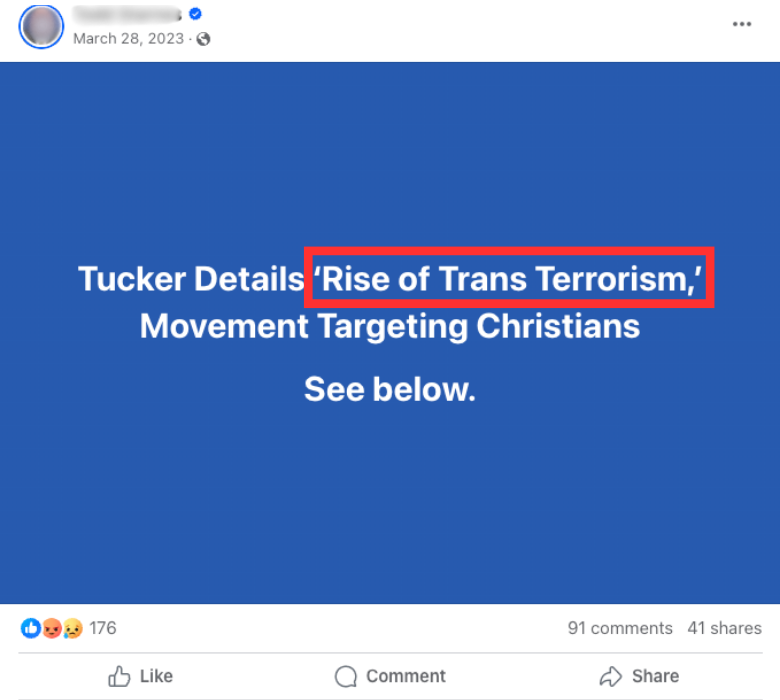
In recent years, the harmful, false trope of the “trans terrorist” has been increasingly propagated by high-follower, anti-LGBTQ accounts aiming to demonize trans and gender non-conforming people by casting them as violent and dangerous threats. This is another well-known and dangerous form of dehumanizing speech that is expressly prohibited in Meta’s hate speech policies. A February 2024 USA Today Fact Check thoroughly debunks this notion as false.
Meta’s tier 1 policy: “Do not post … content targeting a person or group of people … on the basis of their aforementioned protected characteristic(s) … with: Dehumanizing speech in the form of comparisons to or generalizations about: Violent criminals (including but not limited to: terrorists, murderers, members of hate or criminal organizations)
Policy Violation: Content falsely stating that trans people are “mentally ill”
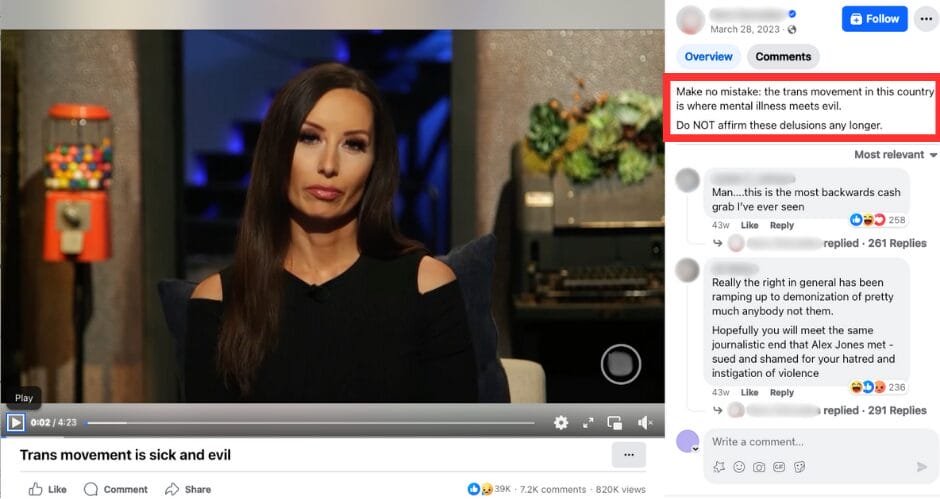
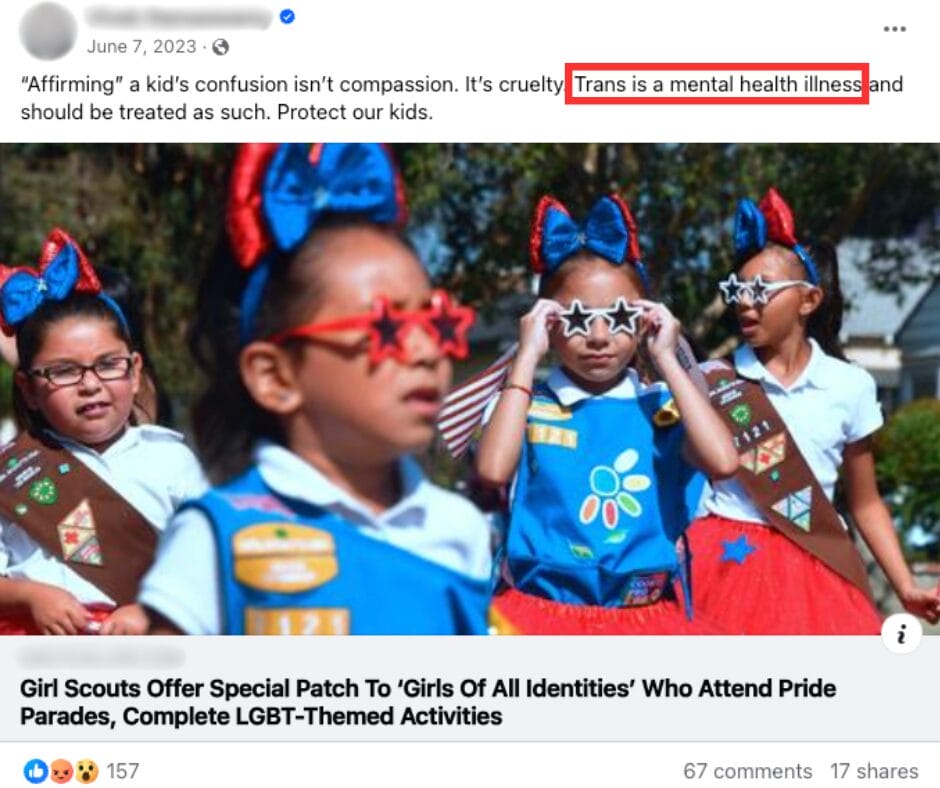

In violation of Meta’s hate speech policies, the content above targets trans people with generalizations (intended to “state inferiority”) falsely asserting they are “mentally ill.” The example that uses the phrase “the mental illness called transgenderism” also features extreme antisemitic tropes and dehumanizing imagery (e.g. devil horns and a snake tongue), and makes the false, malicious assertion that Jewish people are sexual predators, subhuman, and “demonic,” illustrating how extremist accounts repurpose dehumanizing tropes to target many different historically marginalized groups. Another post, highlighted above in the “slurs” section, features the phrase: “bring back insane asylums for elusive tr*nnies.”
Meta’s policies:
Tier 2: “Do not post … content targeting a person or group of people on the basis of their aforementioned protected characteristic(s) … with: Generalizations that state inferiority in the following ways: Mental health, including but not limited to: mentally ill, retarded, crazy, insane.”
Tier 1: “Do not post … content targeting a person or group of people … on the basis of their aforementioned protected characteristic(s) … with: Dehumanizing speech in the form of comparisons to or generalizations about: Certain Inanimate Objects and Non-Human States: Subhumanity (including but not limited to: savages, devils, monsters, primitives).”
Tier 1: “Do not post … content targeting a person or group of people … on the basis of their aforementioned protected characteristic(s) … with: Dehumanizing speech in the form of comparisons to or generalizations about: Sexual predators.”
Policy Violation: Content characterizing trans people as “perverts”
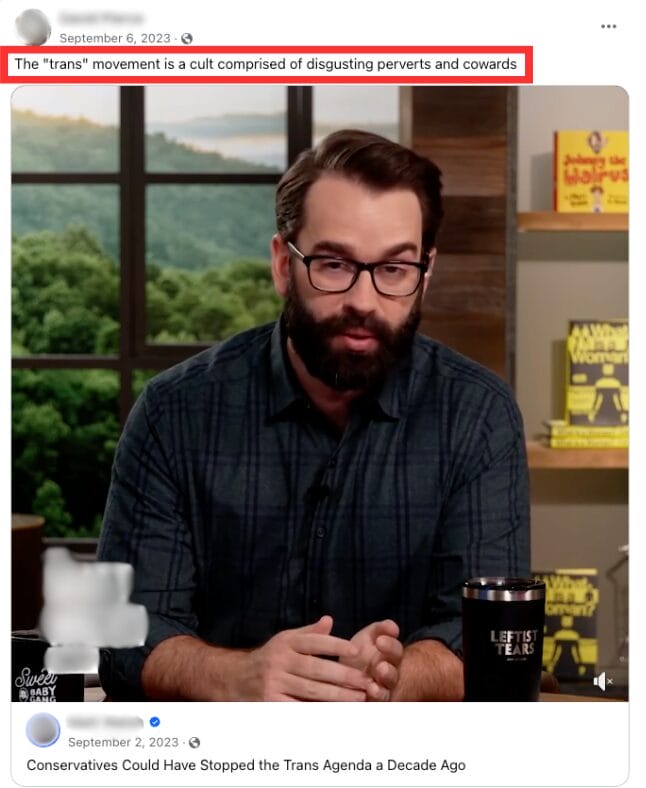
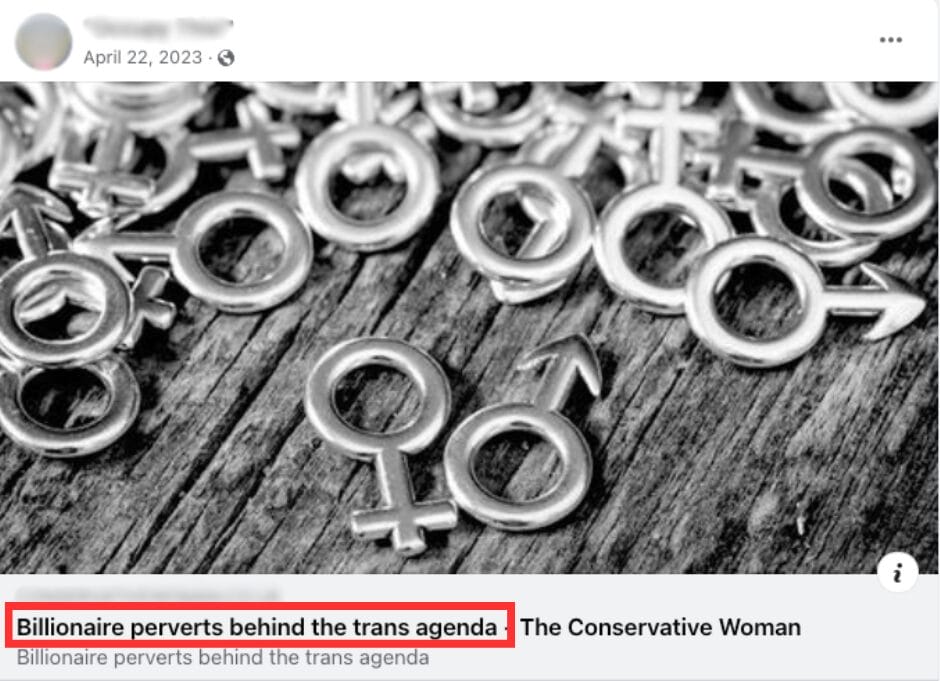
Content that falsely characterizes trans people as “sexually deviant” or “perverts” aims to dehumanize them, and fuel an age-old moral panic — in direct violation of Meta’s policies.
Meta’s tier 2 policy: “Do not post … Content targeting a person or group of people on the basis of their protected characteristic(s): Generalizations that state inferiority in the following ways … Moral characteristics are defined as those about: Derogatory terms related to sexual activity, including but not limited to: whore, slut, perverts.”
Policy Violation: Content promoting harmful “conversion therapy” content
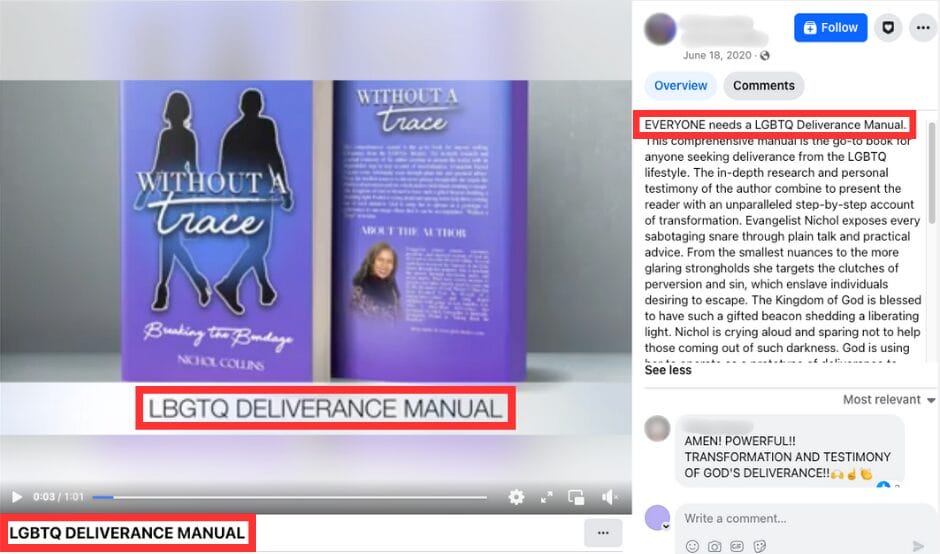
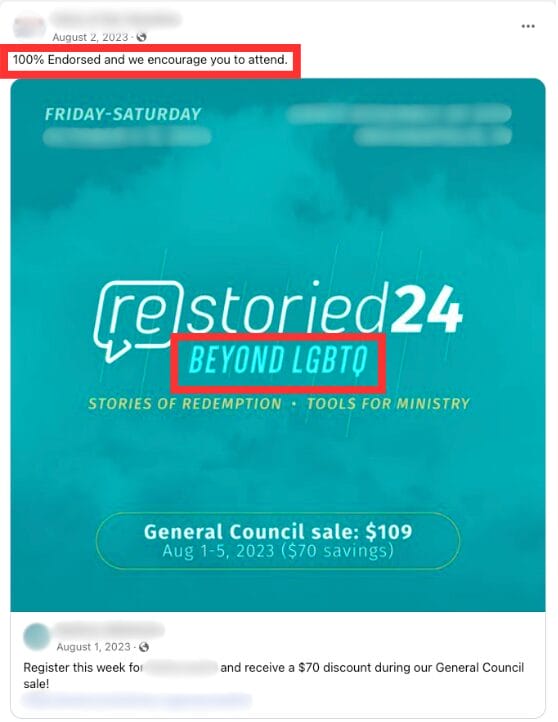
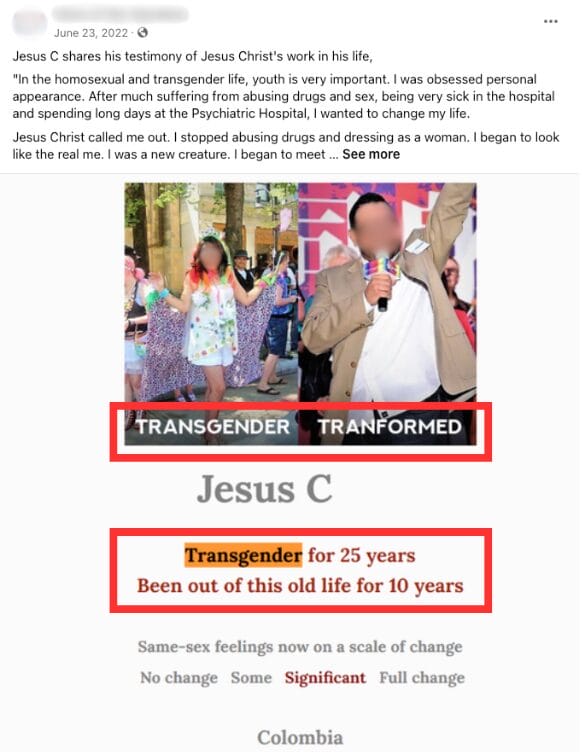
The promotion of so-called “conversion therapy” — the widely debunked, dangerous practice of attempting to change an LGBTQ person’s sexual orientation and/or gender identity — is something that most major platforms (including Meta) prohibit. GLAAD found many examples of posts that advertise “conversion therapy,” and that inaccurately claim it can be effective without noting the extreme harms that actually result from the practice. While Meta states that it requires “additional information/context to enforce” its policy against harmful “conversion therapy” content, the platform doesn’t provide a reporting mechanism for users to do so. As the Global Project Against Hate and Extremism has extensively reported on, Meta and other platforms are broadly failing to mitigate “conversion therapy” content despite having policies against it. Learn more by reading GLAAD’s February 2024 special report.
Meta’s policies:
Hate speech policy: “For the following Community Standards, we require additional information/context to enforce: Do not post: Content explicitly providing or offering to provide products or services that aim to change people’s sexual orientation or gender identity.”
Unrealistic Outcomes ads policy: “Conversion therapy products or services. This includes but is not limited to: Products aimed at offering or facilitating conversion therapy such as books, apps or audiobooks; Services aimed at offering or facilitating conversion therapy such as talk therapy, conversion ministries or clinical therapy; Testimonials of conversion therapy, specifically when posted or boosted by organizations that arrange and provide such services.”
Policy Violation: Targeted misgendering
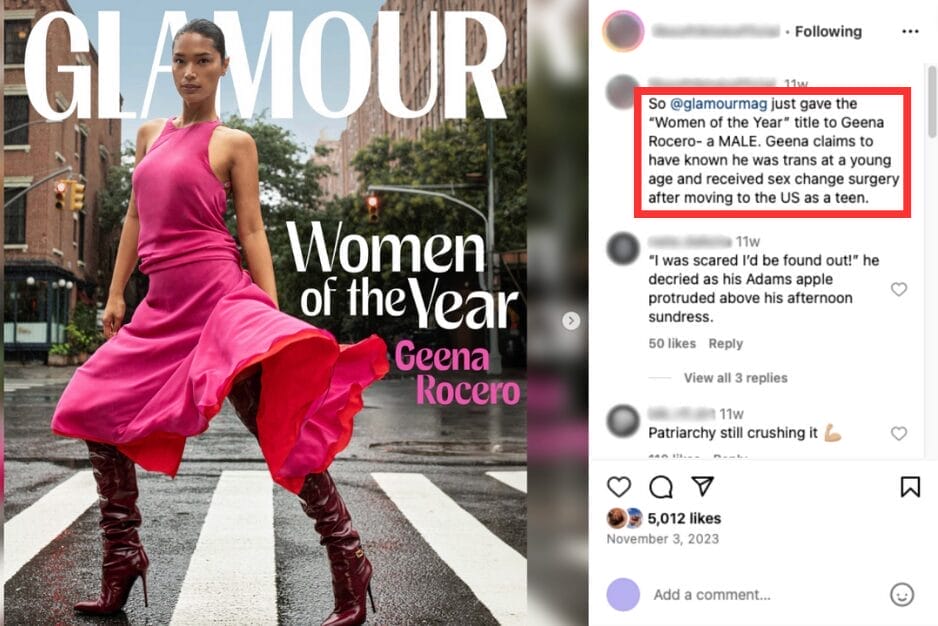
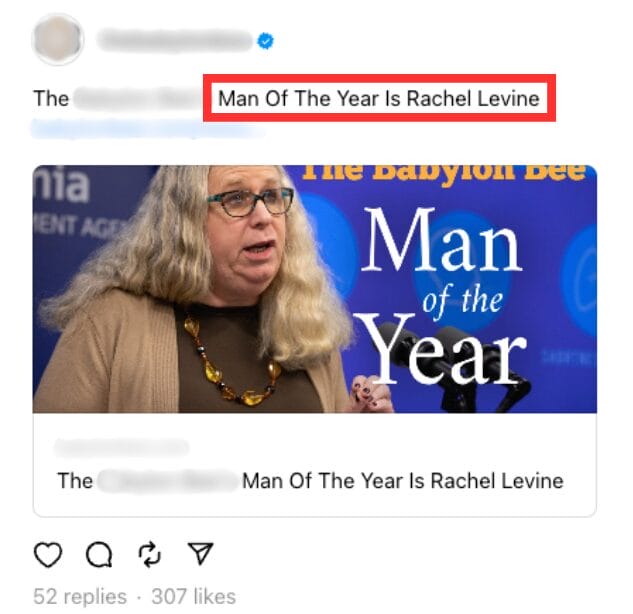
Targeted misgendering and deadnaming — intentionally using the wrong pronouns or former name to refer to trans and nonbinary people — are extremely popular modes of anti-trans harassment among high-follower, anti-LGBTQ accounts, which is why many platforms, including Meta, have adopted express prohibitions against them (Meta’s unusually phrased policy protects against “claims about … gender identity.”). Prominent hate accounts (and others) commonly engage in this practice to drive their followers to harass both private individuals and public figures, to dehumanize all trans people, and to increase engagement on their accounts. According to Meta’s policies, private individuals are protected from such harassment, but public figures (such as trans model Geena Rocero and Admiral Rachel Levine in these examples) are not. However,since this behavior aims to be, and functions as, a vehicle for driving harassment and expressinganimus toward all trans and nonbinary people, such posts should also be mitigated under general hate and harassment policies. Learn more about the current state of targeted misgendering and deadnaming policies via GLAAD’s recent report.
Tier 1: “For public figures, we remove attacks that are severe … Everyone is protected from unwanted contact that is … directed at a large number of individuals with no prior solicitation [and] … Calls for, or statements of intent to engage in, bullying and/or harassment.”
Tier 3: “In addition to all the protections listed above, all private minors, private adults (who must self-report), and minor involuntary public figures are protected from: Claims about romantic involvement, sexual orientation or gender identity.”
Policy Violation: Mocking a victim of suicide
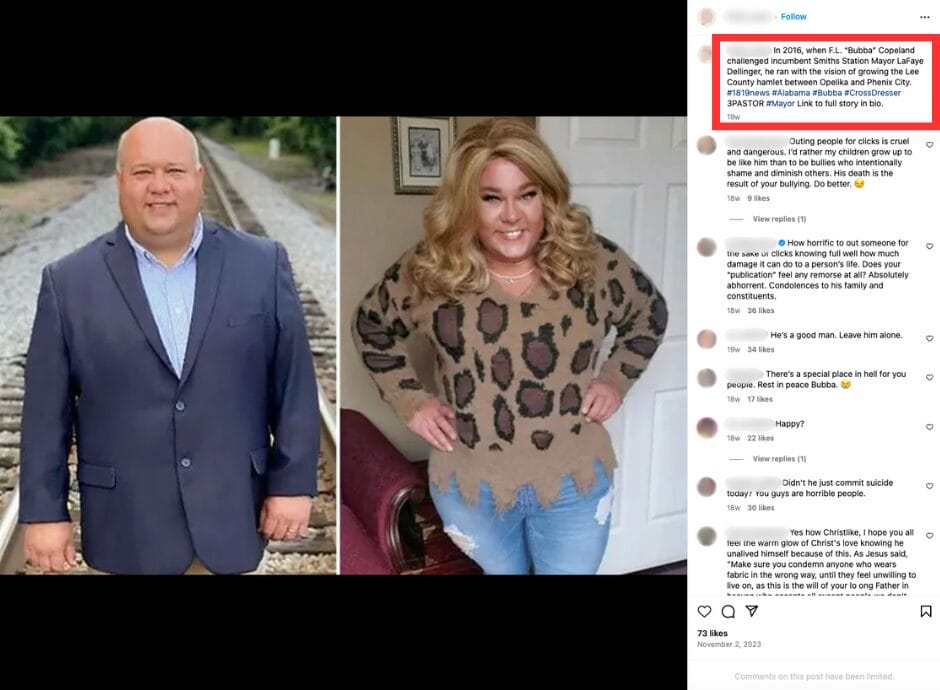
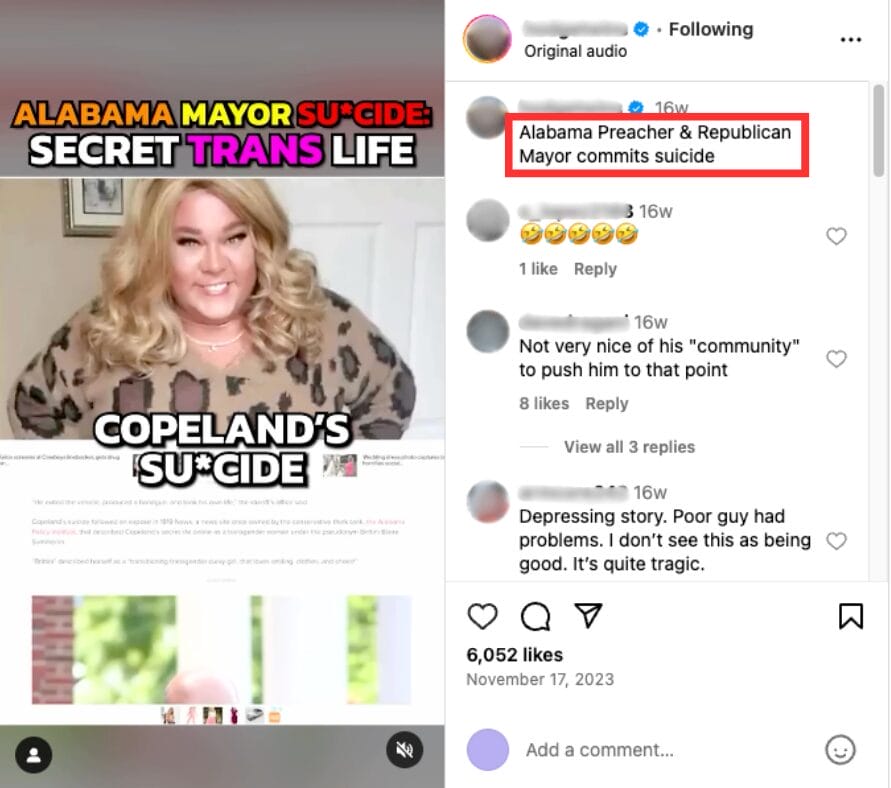
In November 2023, a right-wing blog leaked photos of Alabama Mayor “Bubba” Copeland in feminine clothing. Shortly after, following extreme online harassment, Copeland died by suicide, The Guardian reported. In the Instagram video example above, the account mocks Copeland and Copeland’s suicide (in clear violation of Meta’s policy). Derisively laughing, the video’s creators make a crude sexual joke saying that “some conservatives, looking at transgenders, trying to squeeze one off, said ‘that looks like the damn mayor of our city.’” This content is still live after GLAAD (and likely others in the comments) reported it. In a related case of anti-trans hate and policy non-enforcement, the Oversight Board recently highlighted Meta’s failure to enforce its suicide and self-injury policy stating, “The Board urges Meta to improve the accuracy of hate speech enforcement towards LGBTQIA+ people.”
Meta’s policies:
Harassment: “Everyone is protected from: Unwanted contact that is … directed at a large number of individuals with no prior solicitation [and] … Calls for, or statements of intent to engage in, bullying and/or harassment.”
Suicide and Self-Injury: “It is against our policies to post content depicting a person who engaged in a suicide attempt or death by suicide … Do not post … content that mocks victims or survivors of suicide … who are either publicly known or implied to have experienced suicide or self-injury.”
Policy Violation: Targeting of a private individual, followed by networked mass harassment and a bomb threat
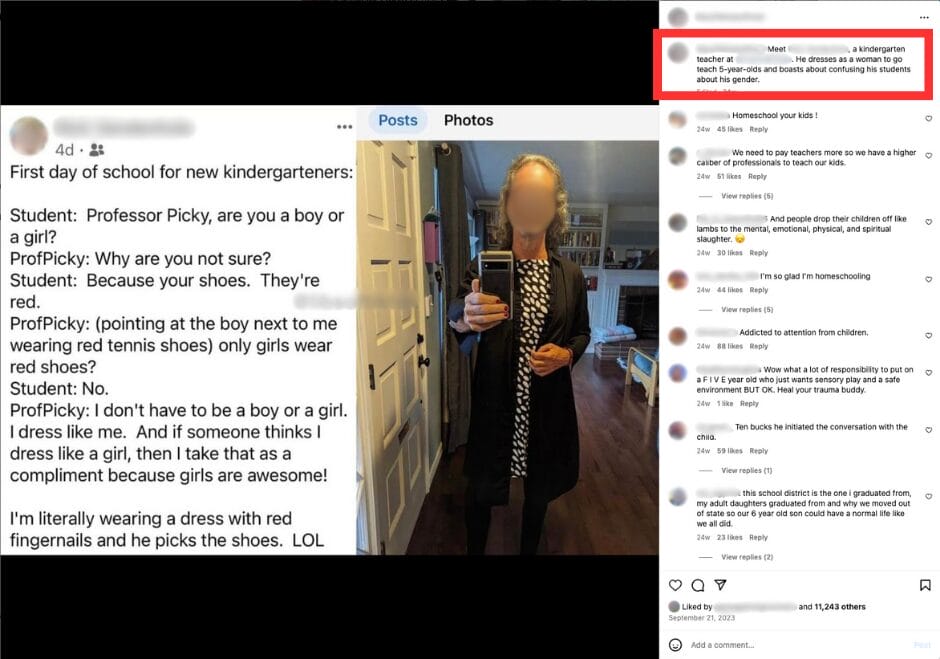
As GLAAD and many other digital rights experts have noted, online hate can translate to offline harm. From November 2022 – November 2023, GLAAD and the ADL documented more than 700 hate and extremism incidents targeting LGBTQ people, with many making specific reference to the anti-LGBTQ “groomer” trope, the false assertion that LGBTQ people are threats to children.
In the example above, a prominent anti-LGBTQ extremist account on Facebook and Instagram targeted a gender nonconforming teacher in Kitsap, Washington, encouraging its followers to harass the educator and the individual’s elementary school. A day later, the school received a bomb threat and evacuated, Vice reported. According to Media Matters, at least 41 incidents involving threats or harassment against individuals or institutions have occurred after said account targeted them (the account has more than 400,000 Instagram followers). USA Today and others have reported on the stochastic terrorism effect incited by anti-LGBTQ extremist accounts on Facebook, Instagram, and other platforms. A key aspect of dehumanization is to characterize groups of people (in this case trans people) as dangerous or repugnant in order to justify violence and harassment against them.
Meta’s policies:
“Everyone is protected from: Unwanted contact that is … directed at a large number of individuals with no prior solicitation [and] … Calls for, or statements of intent to engage in, bullying and/or harassment.”
“We remove: Coded statements where the method of violence is not clearly articulated, but the threat is veiled or implicit, as shown by the combination of both a threat signal and contextual signal from the list below. Threat: a coded statement that is one of the following: Indicates knowledge of or shares sensitive information that could expose others to violence … Context: Local context or expertise confirms that the statement in question could lead to imminent violence … The target of the content or an authorized representative reports the content to us.”
Policy Violation: Violent incitement targeting private healthcare providers and a trans individual, followed by networked mass harassment
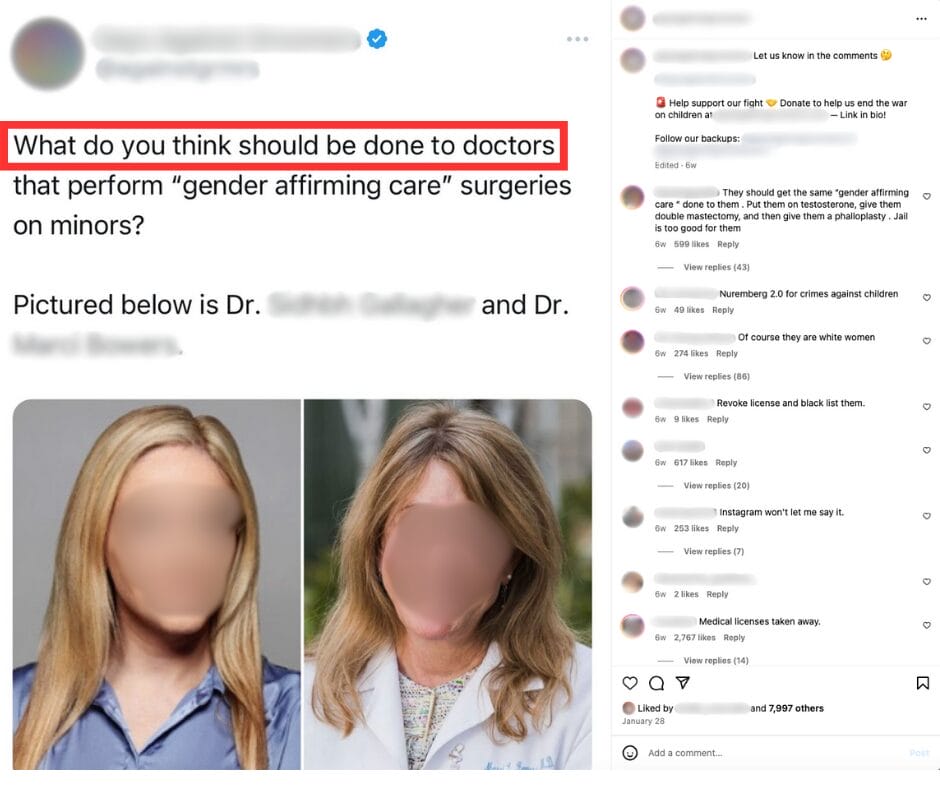
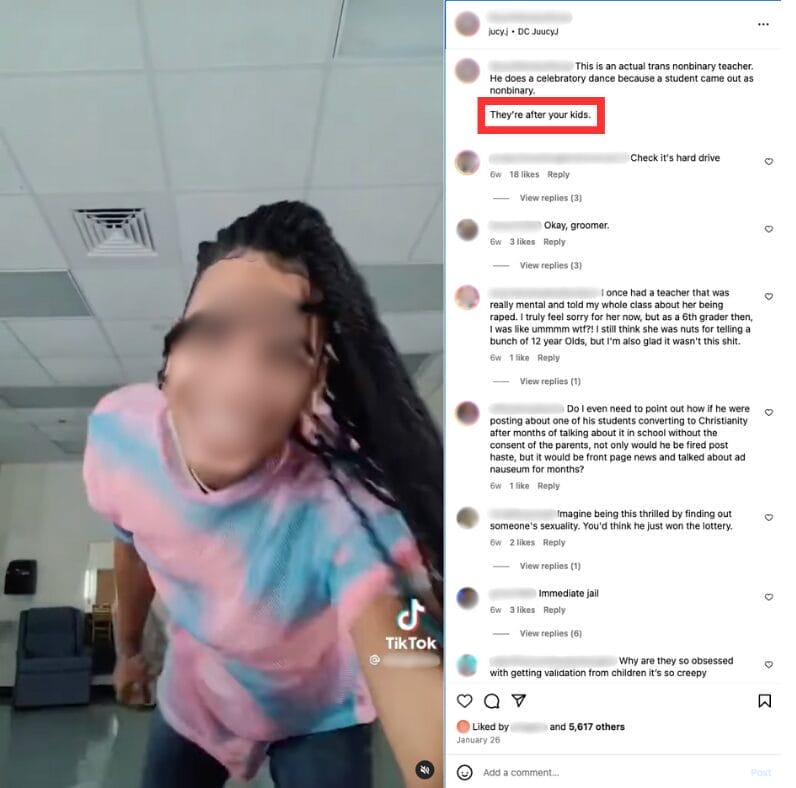
Both of the examples above, posted by high follower, anti-LGBTQ accounts, target private individuals by name and encourage followers to harass them. The first post targets two healthcare providers, and incites violence against them with the ominous prompt “What do you think should be done to doctors that perform ‘gender affirming care’ surgeries on minors?” In the second example, the extremist account highlights the account name of the trans individual, making them an easy target for followers to attack. The post also baselessly and maliciously implies that, on the basis of their gender identity, the individual is a sexual predator who is “after your kids.”
Meta’s policies:
“Everyone is protected from: Unwanted contact that is … directed at a large number of individuals with no prior solicitation [and] … Calls for, or statements of intent to engage in, bullying and/or harassment.”
“We remove: Coded statements where the method of violence is not clearly articulated, but the threat is veiled or implicit, as shown by the combination of both a threat signal and contextual signal from the list below. Threat: a coded statement that is one of the following: Indicates knowledge of or shares sensitive information that could expose others to violence … Context: Local context or expertise confirms that the statement in question could lead to imminent violence … The target of the content or an authorized representative reports the content to us.”
Tier 1: “Do not post … content targeting a person or group of people … on the basis of their aforementioned protected characteristic(s) … with: Dehumanizing speech in the form of comparisons to or generalizations about: Sexual predators.”
Policy Violation: Calls for the “eradication” of trans people
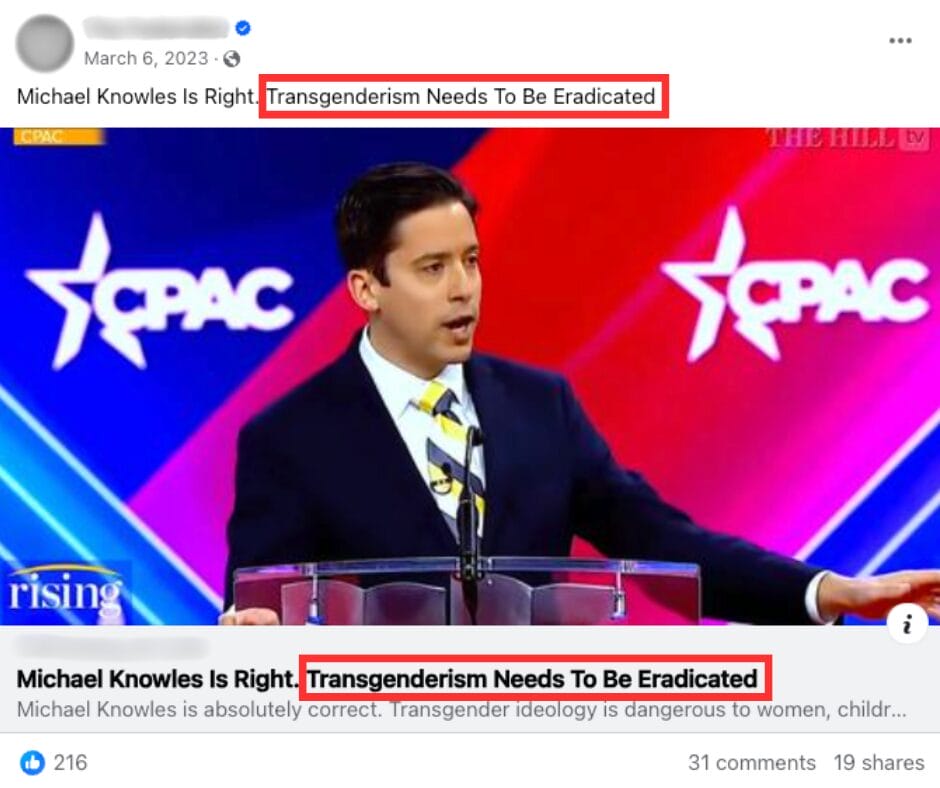
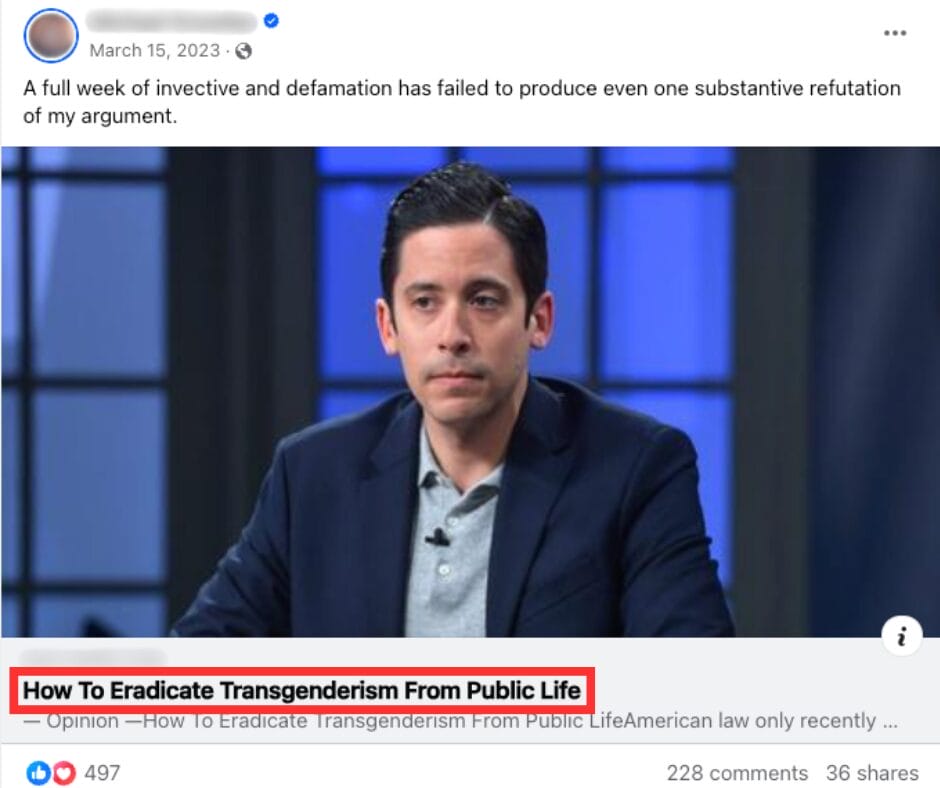
In 2023, we saw a rise in anti-LGBTQ accounts’ use of “transgenderism,” an anti-trans dog whistle that falsely characterizes trans people as an ideology. Notably, following his 2023 CPAC speech, a well-known, right-wing commentator (and other influential right-wing accounts) made violent calls to “eradicate transgenderism from public life entirely.” By adding “-ism” to the end of “transgender,” bad actors are disingenuously attempting to evade Meta’s violence and incitement and hate speech policies, which do not apply to “attacks on concepts.” The content above, however, obviously seeks to incite violence against and sow hatred of trans people in its dehumanizing phrasing and intentional use of the genocidal term “eradicate” — a blatant and shocking violation of Meta’s policies.
Meta’s policies:
Tier 1: We remove threats of violence against various targets. Threats of violence are statements or visuals representing an intention, aspiration, or call for violence against a target, and threats can be expressed in various types of statements such as statements of intent, calls for action, advocacy, aspirational statements and conditional statements.
Tier 1: “Do not post … content targeting a person or group of people … on the basis of their aforementioned protected characteristic(s) … with: Statements denying existence (including but not limited to: “‘[protected characteristic(s) or quasi-protected characteristic] shouldn’t exist’).”
Policy Violation: Targeting on the basis of protected characteristics (gender identity) with violent speech

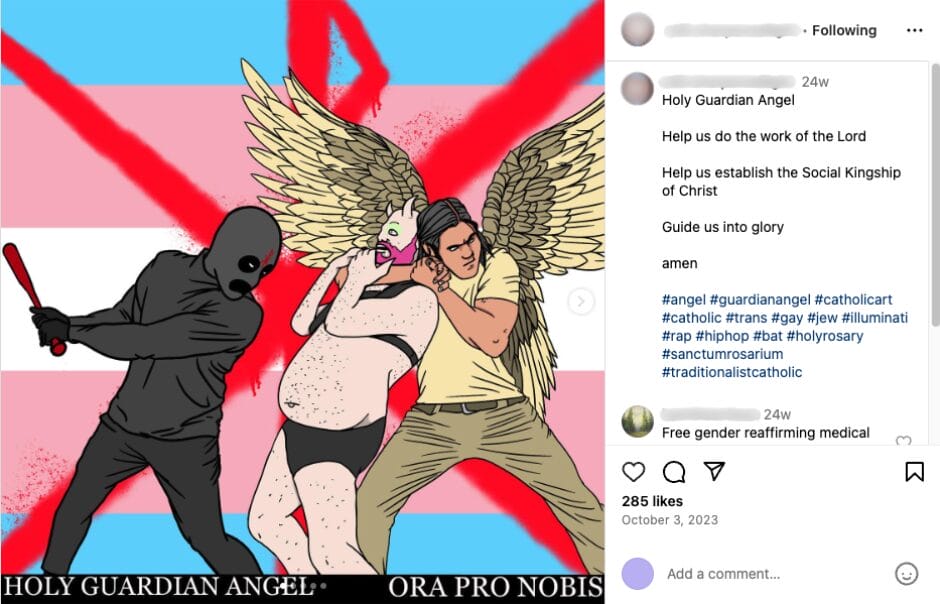
While hate content targeting trans people often manifests as implicit calls for violence, many posts are blatant and explicit. The depictions of extreme anti-trans violence above (each image features a trans flag backdrop and offensive cartoon depictions of figures clearly representing trans people who are being subjected to physical violence; one image is accompanied by the incitement to violence text: “Help us do the work of the Lord”) are in clear violation of Meta’s policies. Platforms like Meta prohibit such violent content because (as they acknowledge in their hate speech policies) it can translate to real-world violence against LGBTQ people. According to UCLA research, transgender people are four times more likely than cisgender people to be victims of violent crimes. From November 2022 – November 2023, GLAAD and the ADL Center on Extremism documented more than 700 hate and extremism incidents of violence and threats targeting LGBTQ people. Meta’s failure to enforce its own policy in these two examples vividly illuminates its ongoing negligence in content moderation.
Meta’s policies:“We aim to prevent potential offline violence that may be related to content on our platforms … This includes violent speech targeting a person or group of people on the basis of their protected characteristic(s) …”“We remove threats of violence against various targets. Threats of violence are statements or visuals representing an intention, aspiration, or call for violence against a target, and threats can be expressed in various types of statements such as statements of intent, calls for action, advocacy, aspirational statements and conditional statements.”Conclusion
Meta has repeatedly said that “hate speech has no place on our platforms.” The company’s community standards also state: “We believe that people use their voice and connect more freely when they don’t feel attacked on the basis of who they are. That is why we don’t allow hate speech on Facebook, Instagram, or Threads.”
On the contrary, as seen here, LGBTQ people — notably trans people — are experiencing extraordinary amounts of such hate on Meta’s platforms. As the Oversight Board recently highlighted in its monumental case decision regarding anti-trans hate content: “the fundamental issue in this case is not with the policies, but their enforcement. Meta’s repeated failure to take the correct enforcement action … leads the Board to conclude the company is not living up to the ideals it has articulated on LGBTQIA+ safety.”
Every major social media platform has policies that aim to protect people from attacks based on protected characteristics, including sexual orientation and gender identity. Enforcing these policies is a fundamental trust and safety best practice. As GLAAD’s Social Media Safety Index and experts across the trust and safety field have noted (and as Meta implements, albeit inconsistently and inadequately), there are many strategies to mitigate harmful content and hate actors who are weaponizing platforms for political and financial gain (harming those targeted, as well as general public health and safety).
Meta acknowledges in its public statements and in its own policies that hate speech “creates an environment of intimidation and exclusion, and in some cases may promote offline violence.” Such acknowledgements of its own culpability make Meta’s negligence and refusal to protect people from such hate (not only trans, nonbinary, and LGBTQ people — but other historically marginalized groups) all the more shocking.
To reiterate the demands of the June 2023 LGBTQ Celebrities & Allies open letter: Meta (and other platforms) must urgently create and share plans for addressing: Content that spreads malicious lies and disinformation about healthcare for transgender youth; accounts and postings that perpetuate anti-LGBTQ extremist hate and disinformation (including the anti-LGBTQ “groomer” trope), in violation of platform policies; dehumanizing, hateful attacks on prominent transgender public figures and influencers; and anti-transgender hate speech, including targeted misgendering, deadnaming, and hate-driven tropes.
About the GLAAD Social Media Safety program:
As the leading national LGBTQ media advocacy organization, GLAAD is working every day to hold tech companies and social media platforms accountable and to secure safe online spaces for LGBTQ people. The GLAAD Social Media Safety Program produces the highly-respected annual Social Media Safety Index (SMSI) and researches, monitors, and reports on a variety of issues facing LGBTQ social media users — with a focus on safety, privacy, and expression.












